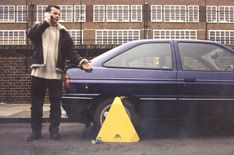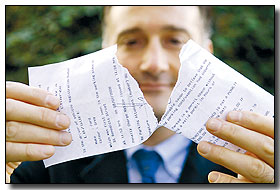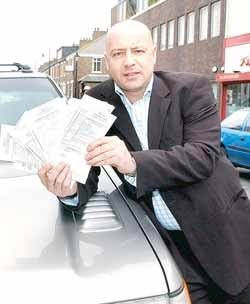This time it has been submitted by a solicitor, Frank Rayner. The adjudicator has requested 5 weeks for consideration.The appellants Skeleton Argument is listed below:IN THE PARKING AND TRAFFIC APPEALS SERVICE
Case number.9060054726
BETWEEN
FRANK RAYNER
And
TRANSPORT FOR LONDON
_____________________________________
APPELLANT’S SKELETON ARGUMENT
INTRODUCTION1. The Appellant seeks to appeal against Transport for London’s rejection of its grounds for appeal
SUMMARY OF THE FACTS2. The Appellant makes no comment on the alleged facts relating to the alleged infringement of the Congestion Charge having sought to appeal the decision of TFL on the basis that its attempt to impose a penalty charge(s) on the Appellant is unlawful
3. The Appellant has refuted TFLs right to impose this charge on the basis that it is extorting money and is in breach of the express provisions of the Declaration / Bill of Rights 1689.
4. Accordingly it is submitted that the appeal should be upheld.
THE ISSUES5. The Appellants submit that the issues for the adjudicator to decide are as follows;
a. Whether the Declaration / Bill of Rights has been repealed by the Congestion Charge Scheme
b. If the Declaration / Bill of Rights has not been repealed whether the Congestion Charge Scheme in particular the facility to levy varying penalty charges is consistent with Declaration / Bill of Rights;
c. In particular whether or not the penalty charge is a "fine or forfeit";
d. that TFL and its agents have no lawful authority to demand money for the alleged infringement that has not been dealt with by a court of law
e. whether PATAS is an independent tribunal;
f. whether the constitution of the PATAS breaches the Appellants right to a fair hearing;
THE LAW6. The Appellant will say that the substantive law relevant to this appeal is the Declaration of Rights and the Bill of Rights upon which it is based
That all grants and promises of fines and forfeitures of particular persons before conviction are illegal and void7. The Appellant further refers to the case of the Metric Martyrs Judgment at sections 62 and 63.
8. The Appellant notes that TFL has referred to the recent application of Mr R de Crittenden for judicial review.
9. The Appellant notes further that TFL relies on an adjudicators decision in Robin Townsend v Transport for London. TFL has declined to produce a transcript of the case however and suggest that the Appellant obtain a copy from PATAS. The applicant has not been issued with a copy of this case and is therefore unable to evaluate it.
SUBMISSIONS
10. The Appellants submits that the Declaration of Rights 1689 contained the terms of the Settlement to put an end to years of revolution. The Agreement was made between William of Orange and those members of the general public that he had called to meet with him and which enabled William to claim legitimate kingship and thereafter summon lawful Parliament.
11. The most important task undertaken by the new Parliament was to create a Parliamentary Recognition of the Declaration of Rights and the complete text of the Declaration of Rights was incorporated into an Act of Parliament known as the Bill of Rights.
12. The Appellant contends that the significance of this is that whilst the Bill of Rights is a creature of Parliament and subject to repeal & or amendment the Declaration is NOT such a creature and accordingly not subject to repeal and or amendment by any parliament.
13. Accordingly even if which is denied the Adjudicator were to hold that the Bill of Rights was amended or repealed by the provisions enacting the Congestion Charge Scheme these cannot be held to apply to the Declaration.
14. The Appellant contends that the Declaration / Bill of Rights have not been amended or repealed by the Congestion Charge Scheme. Further the provisions of the Bill of Rights are clear and express, ie :
That all grants and promises of fines and forfeitures of particular persons before conviction are illegal and void
15. TFL has sought to argue that the Congestion Charge Scheme is compatible with the Bill of Rights as "its intention was to protect the rights of citizens and prevent the imposition of penalties without a right of challenge." The Appellant has challenged TFL to substantiate the basis of this interpretation but notes that TFL has still been unable to do so. It would appear that TFL believes that repeating the same opinion makes it a fact.
16. The Appellant rejects the relevance of this opinion of TFL and is content to rely on the clear and express wording of the Bill of Rights. In particular there is no issue of rights of challenge when a fine or forfeit is void ab initio before conviction.
17. The Appellant has referred to the case known as the Metric Martyr’s case in particular at sections 62 and 63. It is noteworthy that TFL whilst acknowledging that the Appellant has relied on this case fails to comment or challenge the findings.
18. The case is of paramount importance in that Justice Laws held that a later statute did not impliedly repeal an earlier one where there was incompatibility when the earlier statute had a special "constitutional" status. The judge expressly referred to the Bill of Rights 1689 in this category.
19. Accordingly insofar as the penalty charge is a fine or forfeit it is unlawful to seek to impose or enforce it in the absence of conviction.
20. TFL then refers to a further adjudicators decision which is submits supports its contention that the imposition of a penalty charge is a civil matter and therefore not a fine. TFL acknowledges that this adjudicators decision is not directly related to the Congestion Charge Scheme.
21. The Appellant has no access to this decision and it is noteworthy that TFL declines to provide a copy nor indeed has it cited any passage of any relevance. Notwithstanding the Appellant denies it has any relevance to the instant appeal. Insofar as it alleges otherwise TFL should be compelled to make full and detailed submissions on the point given its importance.
22. As to the substantive issue as to whether or not the penalty charge is a fine or forfeit the Appellant finds the argument disingenuous. The fact is that a penalty charge meets all the criteria for the definition of a fine or forfeit and to maintain otherwise is emabarrassing to the Appellant.
23. The penalty charge is clearly intended to intimidate and enforce conduct by the use of financial sanctions. If the matter were a purely civil one then the Appellant suggests that the sum levied should bear some resemblance to the loss or damage incurred by TFL. Clearly this is not the case. To continue the civil analogy further it is well established that a penalty at civil law is void at common law.
24. TFL further refers to the recent application by Mr R de Crittenden before Mr Justice Collins. Whilst the judge declined Mr de Crittenden’s application for judicial review it is denied that this has settled any matters as Mr de Crittenden is filing papers with the Court of Appeal and may even take it to the House of Lords if necessary.
25. Further it is not apparent from TFL reference to Mr de Crittenden’s application whether Mr Justice Collins considered the arguments raised by the Appellant in this appeal in relation to the Congestion Charge, nor Mr Justice Laws judgment in the Metric Martyrs case. TFL makes no submissions on these points.
26. Notwithstanding the foregoing the Appellant challenges the independence and impartiality of the adjudicator and refers the adjudicator to the attached extract from submissions made to PATAS in the matter of an appeal by Alan Parker against TFL, in particular the submissions of Barrie Segal of AppealNow.com.
CONCLUSION27. In the premises the adjudicator is requested to find that TFL has no authority to impose the penalty as claimed or at all, that its purported enforcement should be rejected and the appeal upheld.
FRANK RAYNER
7 th October 2006



 EU UNFIT FOR PURPOSE
EU UNFIT FOR PURPOSE

 What Car?
What Car?



